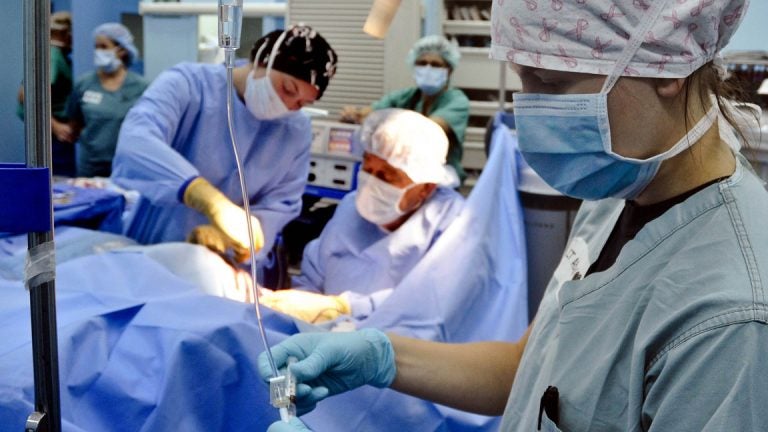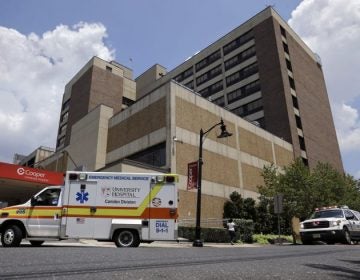N.J. hospital group joins multistate health care partnership
It’s teaming up with Pennsylvania and Ohio counterparts to improve patient safety and hospital practices

A new multistate health care partnership will work with regional hospitals to share best practice strategies. (David Mark/Pixabay)
This article originally appeared on NJ Spotlight.
–
The New Jersey Hospital Association will join its counterparts in Pennsylvania and Ohio in an initiative dedicated to improving patient safety and health care systems that serve some 33 million residents in the three states.
The joint venture — Q3 Quality Health Partners, or Q3HIP, announced on Thursday — is also an effort to ensure health care systems in these three states continue to have access to federal grants for quality improvement programs in Medicare; changes in the way it will be administered appear to favor large, regional organizations. There are 6 million Medicare beneficiaries in the three states, including at least 1.5 million in New Jersey.
The organizations said Q3HIP allows them to build on their collaborative work as part of an existing national hospital innovation network, in which all three state groups are members. Between 2010 and 2014, this national initiative helped reduce medication errors, patient falls and other mishaps among Medicare members, and saved billions of dollars in federal spending.
Addressing maternal health, opioid addiction
But while the national quality program has focused on seniors, this new multistate partnership will also seek to address maternal health, opioid addiction, and other issues in patients of all ages. New Jersey has struggled with a high maternal death rate — which is four times greater for black women, compared to white mothers — and substance use disorders now end thousands of lives annually in the state.
“Each of our associations has been part of the national (patient safety) initiative to improve health care, but our shared vision for better health doesn’t stop at state boundaries,” said NJHA president and CEO Cathy Bennett, who also served as state health commissioner during former Gov. Chris Christie’s second term. “By combining our expertise and resources in a regional approach, we can bring better care to our communities and greater value to our health care system.”
To achieve these goals, the group said Q3HIP will work with hospitals and other health care providers in the three states to share best practice strategies, care models, decision-making tools, and methods for tracking progress. The work of higher-performing hospitals will be used to guide those with lesser outcomes, and all will be the site of best-practice training sessions for caregivers.
NJHA is the state’s trade group representing more than 400 health care facilities, including 72 acute care hospitals. While some have struggled with certain services, the Leapfrog Group — a national nonprofit that assesses quality — has given Garden State facilities high marks in recent years.
The Hospital and Healthsystem Association of Pennsylvania (HAP) plays a role similar to NJHA for 240 provider sites in the Commonwealth, while the Ohio Hospital Association — founded in 1915 as the first of its kind in the nation — works with more than 270 facilities and 13 health systems in that state.
“HAP is proud to leverage Pennsylvania hospitals’ longstanding history of producing measurable health care quality improvements with those from our partners in New Jersey and Ohio to improve the health and well-being of even more Americans in the years to come,” said Andy Carter, the group’s president, and CEO.
A focus on patient safety
All three associations have for years participated in the federal Centers for Medicare and Medicaid Services’ (CMS) national Partnership for Patients initiative, which focuses on keeping hospital patients from getting injured or more sick and helping them heal without complications.
Specifically, it has targeted things like post-surgical infections, bedsores, and hospital readmissions within a month of discharge, all considered key metrics of patient safety; the changes involved also saved Medicare $28 billion over four years, the group said.
“Knowledge has no borders and more knowledge means better preparation and overall results. Healthcare is no different,” reads the NJHA’s web page on the program. The work has benefited Garden State patients by driving down the rates of diseases like sepsis, which is common in hospital settings.
CMS is changing how it approaches these quality initiatives, according to Modern Healthcare, and has introduced new guidelines for contractors seeking to test these programs. The centers want to fund larger, more regional projects with $15 million grants, and Q3HIP is designed to be eligible for these initiatives.
“Health care is changing rapidly, demanding innovative approaches to improve patient outcomes and reduce costs,” said Mike Abrams, president, and CEO of the Ohio Hospital Association. “As a leading organization for health care improvement in Ohio, OHA worked to develop this exceptional collaborative to advance best practices with patient care while leveraging the expertise and resources of three state organizations.”
WHYY is your source for fact-based, in-depth journalism and information. As a nonprofit organization, we rely on financial support from readers like you. Please give today.




